#Jonathan galassi
Text
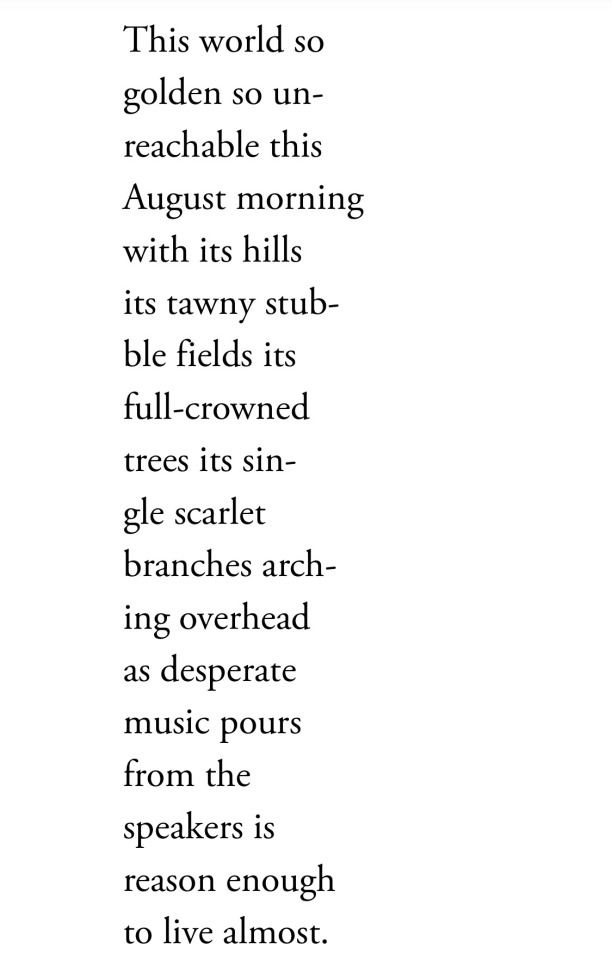
Jonathan Galassi, from “August,” in Left-handed [ID in alt text]
#w#poetry#jonathan galassi#we’ll dream of a longer summer#it is a serious thing just to be alive on this fresh morning in this broken world
238 notes
·
View notes
Text
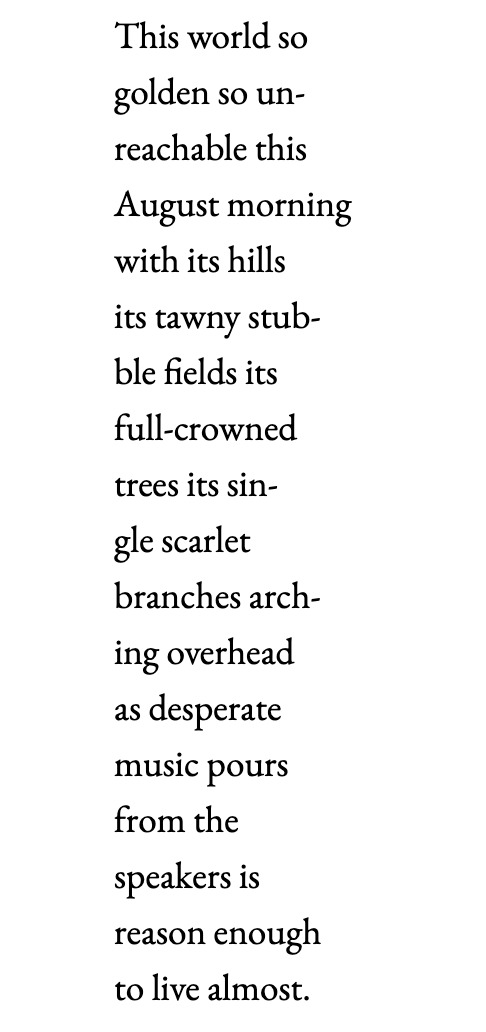
august by Jonathan Galassi
8 notes
·
View notes
Text
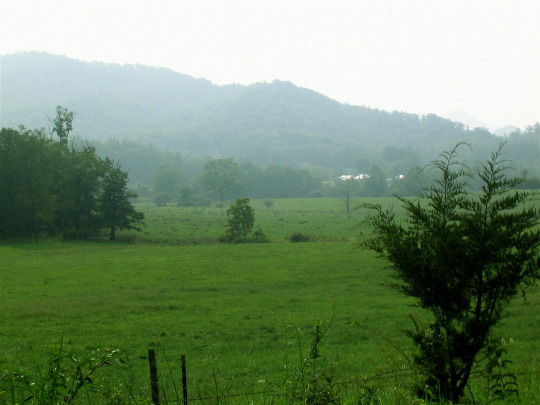
[Tessentee Road :: from my files]
* * * *
« This lonely hill was always dear to me,
and this hedgerow, which cuts off the view
of so much of the last horizon.
But sitting here and gazing, I can see
beyond, in my mind’s eye, unending spaces,
and superhuman silences, and depthless calm,
till what I feel
is almost fear. And when I hear
the wind stir in these branches, I begin
comparing that endless stillness with this noise:
and the eternal comes to mind,
and the dead seasons, and the present
living one, and how it sounds.
So my mind sinks in this immensity:
and foundering is sweet in such a sea. »
— Giacomo Leopardi, “The Infinite” (1819), trans. Jonathan Galassi
[exhaled-spirals]
#Giacomo Leopardi#The Infinite#Jonathan Galassi#exhaled-spirals#poem#poetry#this lonely hill#Tessentee road#my flickr files
5 notes
·
View notes
Text
Book review: School Days
Looking for a gay novel to read this summer? I just finished Jonathan Galassi's novel, School Days, and recommend it for those who enjoy gay fiction. The novel is newly published and now available for purchase.
School Days by Jonathan Galassi is a rivetting 200+ page novel told from the perspective of Sam Brandt, a former student of Leverett, an elite boarding school in New England, and current English teacher at the prep school.
The story opens in the fall of 2007 when Sam is asked by the school’s head about a disgruntled former student who attended Leverett when he was a student there. The…

View On WordPress
3 notes
·
View notes
Text
"Turing Forty"

View On WordPress
0 notes
Text
How to Make the Most of National Poetry Month
In my 2022-2023 planner, during this week which is my Spring Break, I wrote in all capital letters: START LIVING MY BEST WRITING LIFE! What better time to start than during National Poetry Month?

View On WordPress
#Author#Barnes and Noble#blueberry scones#Bookstores#coffee shops#Creative Writer#Creative Writing#Edward Hirsch#ee cummings#Her Beautiful Monster#How to Read a Poem and Fall in Love With Poetry#Jonathan Galassi#Mandi Bean#Moody Blue#National Poetry Month#Poetry#Reader#Reading#Robyn Cresswell#The FSG Poetry Anthology#Writer#Writing#Writing Life#Writing schedule
1 note
·
View note
Text
Unfinished Business // Primo Levi
Sir, please accept my resignation
As of next month,
And, if it seems right, plan on replacing me.
I’m leaving much unfinished work,
Whether out of laziness or actual problems.
I was supposed to tell someone something,
But I no longer know what and to whom: I’ve forgotten.
I was also supposed to donate something —
A wise word, a gift, a kiss;
I put it off from one day to the next. I’m sorry.
I’ll do it in the short time that remains.
I’m afraid I’ve neglected important clients.
I was meant to visit
Distant cities, islands, desert lands;
You’ll have to cut them from the program
Or entrust them to my successor.
I was supposed to plant trees and I didn’t;
To build myself a house,
Maybe not beautiful, but based on plans.
Mainly, I had in mind
A marvelous book, kind sir,
Which would have revealed many secrets,
Alleviated pains and fears,
Eased doubts, given many
The gift of tears and laughter.
You’ll find its outline in my drawer,
Down below, with the unfinished business;
I didn’t have the time to write it out, which is a shame,
It would have been a fundamental work.
(translated from the Italian by Jonathan Galassi)
#poetry#Primo Levi#Jonathan Galassi#Italian poetry#procrastination#unfinished work#what work is#suicide#depression#unfinished business#despair
1 note
·
View note
Text
favourite poems of june
chase twichell the snow watcher: "hunger for something"
hester knibbe hungerpots (tr. jacquelyn pope)
jan beatty an eater, or swallowhole, is a reach of stream
sally wen mao the toll of the sea
peter everwine rain
rebecca lindenberg the logan notebooks: "poetic subjects"
john kinsella native cut wood deflects colonial hunger
katie peterson permission: "the truth is concrete"
linda hogan dark. sweet.: "innocence"
jános pilinszky (tr. george gömöri & clive wilmer) van gogh's prayer
david sullivan the day the beekeeper died: sulaymaniyah
sandra simonds you can't build a child
kari edwards bharat jiva: "ready to receive remains..."
george kalogeris rilke rereading hölderlin
philip nikolayev letters from aldenderry: "a midsummer's night stroll"
franz wright the raising of lazarus
erin belieu black box: "i heart your dog's head"
joseph brodsky collected poems in english, 1972-1999: "the hawk's cry in autumn"
jonathan galassi north street and other poems: "may"
stanley kunitz the collected poems of stanley kunitz: "end of summer"
robin blaser the holy forest: collected poems of robin blaser: "a bird in the house"
liu xia (tr. jennifer stern & ming di) empty chairs
wilfred owen exposure
mahogany l. browne this is the honey
diane lockward the uneaten carrots of atonement: "for the love of avocados"
peter balakian ozone journal: "here and now"
(tw: miscarriage) kathryn nuernberger rag & bone: "translations"
ailbhe ní ghearbhuigh conriocht ["werewolf"] (tr. billy ramsell)
craig arnold meditation on a grapefruit
anzhelina polonskaya (tr. andrew wachtel) to the ashes: "a few words about van gogh"
support me
#tbr#tbr list#poetry#list#june#poems#poem#chase twichell#the snow watcher#hunger for something#hester knibbe#hungerpots#jacquelyn pope#sandra simonds#you can't build a child#katie peterson#the truth is concrete#permission#john kinsella#native cut wood deflects colonial hunger#sally wen mao#the toll of the sea#may#north street#north street and other poems#jonathan galassi#peter everwine#rain#philip nikolayev#letters from aldenderry
151 notes
·
View notes
Text
Things Read in May
Articles & Essays:
Could this pottery shard be a 1,000 year old hand grenade? Signs point to yes
How a24 became the ultimate film cult
How many well intentioned people dehumanize children
Just how white is the book industry?
Nintendo mario movie leaks: dmca used to suppress spoiler discussion
Do the poor pay more for housing? Exploitation, profit, and risk in rental markets
After years of declines, numbers of wintering monarch butterflies rise by 35% in mexico
My chemical romance's gerard way: the six pack q&a
No way out but war
#metoo is over if we don't listen to imperfect victims
'Arrows for the war'
How to respond to criticism
Why young koreans love to splurge
Which birds are the biggest jerks at the feeder?
A tale of two utopias: musk and bezos in outer space
Religion, racism and the church of england in doctor who
Aerial photos by bernhard lang capture the largest aircraft boneyard in the world
California is about to test its first solar canals
How I started to see trees as smart
The movie star and me
The movies discover the teen-age girl
In yellowjackets, the girls are hungry to live
In defense of purple prose
Maybe she had so much money she just lost track of it
As an added bonus, she paid for everything: my bright-lights misadventure with a magician of manhattan
Jessica pressler on what's real and not about inventing anna
Mysteries persist after initial report into china eastern jet crash
Revisiting scenes from the suburbs, spike jonze and arcade fire's take on spielberg-style suburbia
Online trolls actually just assholes all the time, study finds
In spite of it all, we are still living: interview with ada limón
Poetry:
Fuck your lecture on craft, my people are dying by noor hindi
The rules by leila chatti
Lessons from a mirror by thylias moss
May by jonathan galassi
Foaling season by ada limón
Summer by robin coste lewis
Summer by joanna fuhrman
Summer by heather christle
Peach by d. h. lawrence
Phenomenal woman by maya angelou
Books & Short Stories:
Cherry by Nico Walker
WLT: A Radio Romance by Garrison Keillor
Something Weird I Heard About Rebecca by Yves
On Longing: Narratives of the Miniature, the Gigantic, the Souvenir, the Collection by Susan Stewart
Children of the Corn by Stephen King
Q & A: A Novel by Vikas Swarup
1K notes
·
View notes
Photo

‘Venice was a hallucinatory incubus, the most artificial environment in the world: Disneyland for grown-ups. It reeked of s** and its putrescent partner, death. Thomas Mann had caught its rouged, feverish aura perfectly.’ – Jonathan Galassi
#Venezia#Venice#Italia#Italy#Night City#cityscpae#old city#history#bridge#Tourism#river#travel#photography#urban travel#quote
21 notes
·
View notes
Text

"Las siete edades"
En mi primer sueño el mundo parecía
lo salado, lo amargo, lo prohibido, lo dulce
En mi segundo sueño descendía,
era humana, no veía nada de nada
bestia como soy
debía tocarlo, contenerlo
me escondí en la arboleda,
trabajé en los campos hasta que quedaron yermos
un tiempo
que nunca volverá-
el trigo seco en gravillas, cajones
de higos y aceitunas
Hasta amé alguna vez, a mi manera
repugnante, humana
y como todo el mundo llamé a ese logro
libertad erótica,
por absurdo que parezca
El trigo cosechado, almacenado; seca
la última fruta: el tiempo
que se acumula, sin usar,
¿también termina?
Muere la poeta Louise Glück, Premio Nobel de Literatura en 2020, a los 80 años. La muerte de Glück, que escribió sobre variados temas como la infancia, la familia, la soledad y la muerte, inspirada en la mitología antigua y en su propia vida, fue notificada por su editor en Farrar, Straus & Giroux, Jonathan Galassi. Aclamada como una de las escritoras vivas más importantes de Estados Unidos, ganó también el Premio Pulitzer en 1993 gracias a El iris salvaje y el National Book Award en 2014 con Noche fiel y virtuosa, y era considerada una de las poetas vivas más importantes del país, mucho antes de que ganara el Premio Nobel.
5 notes
·
View notes
Text
Non esistenza tra materia oscura e gravità quantistica
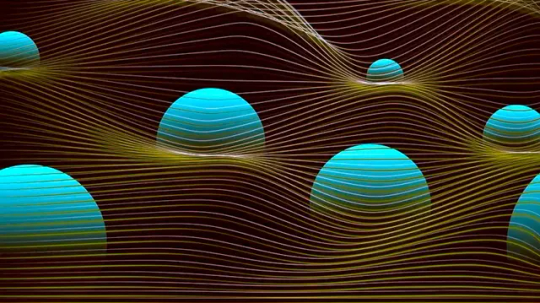
Nuova teoria post-quantistica della gravità rigetta l’esistenza della materia oscura. Da anni gli scienziati cercano di conciliare la relatività generale di Einstein e la meccanica quantistica in una teoria unificata, la gravità quantistica, nella speranza di individuare un unico formalismo matematico capace di spiegare i fenomeni fisici sia su larga che su piccola scala.
L’insuccesso degli innumerevoli tentativi finora effettuati ha indotto il fisico inglese Jonathan Oppenheim a domandarsi se quantizzare la gravità sia realmente la mossa giusta: perché, al contrario, non concentrarsi soltanto sulla gravità, modificando la relatività generale? Da qui la proposta di una nuova teoria post-quantistica della gravità, che sembra escludere l’esistenza della materia oscura.

È stata annunciata la nascita di una nuova teoria post-quantistica della gravità, che tratta quest’ultima in modo classico preservando però gli effetti quantistici (come i pattern a cerchi concentrici generati dal fenomeno dell’interferenza in alcuni esperimenti). Crediti: Isaac Young.
Le due teorie pilastro della fisica moderna sono la relatività generale di Einstein, che delinea la geometria dello spazio-tempo impressa dalla gravità, e la meccanica quantistica, che invece si occupa della fenomenologia relativa alla materia e alla radiazione a scale atomiche e subatomiche. Poiché le equazioni di Einstein mettono in relazione lo spazio-tempo dominato dalla gravità con la materia, presente sotto forma di masse che ne deformano la struttura, notevole sforzo è stato messo nel cercare di combinare questi due aspetti in un’unica trattazione matematica: nasce così l’ipotesi della gravità quantistica.
In un recente studio su tale tematica il ricercatore inglese Jonathan Oppenheim si è chiesto se sia però davvero indispensabile quantizzare la gravità per ottenere un quadro fisico unitario. A tal proposito, nella sua teoria post-quantistica della gravità Oppenheim sembra propendere per una risposta negativa.
Egli sostiene infatti che lo spazio-tempo possa essere inteso come un fluido continuo dal punto di vista non solo macroscopico, ma anche microscopico: esso dovrebbe dunque essere modellizzato interamente nel modo classico, ovvero come prescritto dalla relatività generale, mentre il formalismo quantistico verrebbe riservato esclusivamente alla materia.

Equazioni di Einstein per la gravità quantistica. Il termine di sinistra rappresenta la gravità (tensore di Einstein), mentre quello di destra la materia (tensore energia impulso). In particolare, i simboli delle parentesi (brackets) e del cappelletto in cima al tensore energia impulso indicano che esso viene trattato come un operatore quantistico. Crediti: Oppenheim.
Tuttavia, eliminare la discretizzazione (i.e., quantizzazione) dello spazio-tempo alle piccole dimensioni implica ammettere che esso, al pari della metrica che lo descrive, sia soggetto a fluttuazioni stocastiche (i.e., casuali), che lo renderebbero “traballante” anziché liscio. Ma, soprattutto, questo comportamento stocastico sarebbe responsabile di una modifica della stessa relatività generale a bassi valori di accelerazione gravitazionale, ossia nel cosiddetto “regime diffusivo”, perché qui le fluttuazioni stocastiche risulterebbero non trascurabili.
Invero, esse avrebbero l’effetto di una forza entropica: stimolando il moto browniano (i.e., il moto casuale delle particelle del fluido cosmico), esse fornirebbero cioè alle stelle con minore velocità una quantità di energia aggiuntiva, accelerandole. Dal momento che tali stelle sono situate nelle zone più esterne delle galassie, dove appunto vale il regime diffusivo per via della più bassa gravità, esse andrebbero a giustificare il tratto piatto delle curve di rotazione, che ci aspetterebbe fosse anzi kepleriano (i.e., declinante) proprio per il rallentamento del moto stellare a grandi raggi.
Ergo, le fluttuazioni stocastiche sostituirebbero l’attrazione gravitazionale esercitata dagli aloni di materia oscura che circondano le galassie sulle stelle ai loro margini: in altre parole, in questo scenario l’esistenza della materia oscura non sarebbe più necessaria.
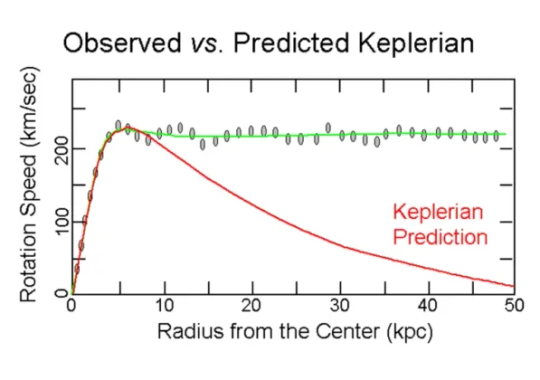
Curva di rotazione di una galassia, che mostra l’andamento della velocità delle stelle in funzione del raggio, ovvero della distanza dal centro galattico. La linea rossa indica la predizione teorica (tratto kepleriano a grandi raggi), mentre quella verde ciò che viene osservato (tratto piatto a grandi raggi). Crediti: R. Pogge.
D’altronde, nota Oppenheim, la sua non è la prima teoria alternativa della gravità a giungere a tale conclusione: per esempio, già nel 1983 la teoria della gravità modificata di Milgrom (i.e., MOND, Modified Newtonian Dynamics), era riuscita a spiegare l’appiattimento delle curve di rotazione delle galassie attraverso una revisione del valore della gravità alle basse accelerazioni, senza pertanto chiamare in causa la materia oscura.
Il rinnovato interesse nei confronti della MOND a seguito dei risultati emersi nelle ultime simulazioni dinamiche di ammassi di galassie e supportati da evidenze osservative costituisce un punto di forza del ragionamento di Oppenheim. Ciononostante, la neonata teoria gravitazionale post-quantistica dello scienziato è ancora giudicata piuttosto controversa a causa dell’attuale mancanza di test: la formulazione matematica, per quanto rigorosa e dettagliata, certo non basta a dissolvere lo scetticismo del mondo astrofisico.
Ciò è tanto più vero se si considera che numerose e svariate sono ad oggi le prove a favore della materia oscura, prima fra tutte la formazione delle strutture nell’Universo primordiale. Ma, come scrive Oppenheim, “la gravità è famosa per essere truffatrice”: meglio insomma non lasciarsi ingannare, scartando a priori delle congetture che potrebbero infine non rivelarsi poi così improbabili. Ad ogni modo, il fisico inglese assicura che, prima di compiere affermazioni azzardate, saranno realizzate simulazioni numeriche e posti vincoli basati sui dati osservativi. Tutto fa quindi pensare che ne sapremo presto di più.
Read the full article
0 notes
Text
2022 Summer reading suggestions
Later this week the summer season begins w/ Memorial Day Weekend. Here are some novels to consider adding to your summer reading list. #gaylit #gayfiction
Memorial Day Weekend represents the start of the 2022 summer season. In honor of the start of my favorite season, I’ve included a few books for you to consider adding to your summer reading list.
Two Nails, One Love by Alden Hayashi
Two Nails, One Love by Alden Hayashi is a quick and thoroughly enjoyable read about a gay Japanese-American man, Ethan, and the conflicted relationship he has with…

View On WordPress
1 note
·
View note
Text
Spotlight Poetry - Your Hand was Trying the Keyboard - A Poem by Eugenio Montale
© Kaoru Shibuta, Dance, 2021
Your Hand was Trying the Keyboard by Eugenio Montale
Translated by Jonathan Galassi
Your hand was trying the keyboard,your eyes were following the impossiblesigns on the sheet: and every chordwas broken, like a voice in grief.
I noticed everything around turn tender,seeing you helpless, blocked, unsurein the language that was most your own:beyond the half-shut…
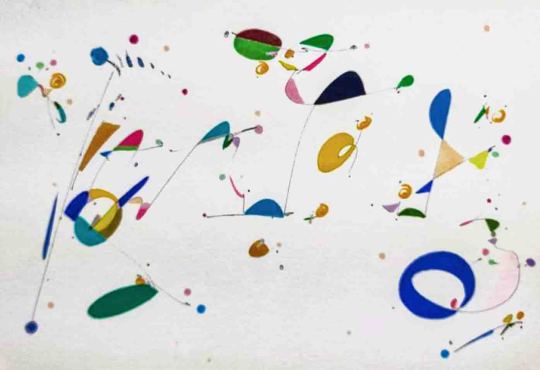
View On WordPress
#Art Music Photography Poetry Quotations#Eugenio Montale#Goff James Art Music Photography Poetry Quotations#goffjamesart#Painting#Poem#Poet#Poetry#Your Hand was Trying the Keyboard
0 notes
Link
[ad_1] Celebrated Nobel-winning poet Louise Gluck has died aged 80, her editor has confirmed. Her death was confirmed on Friday by Jonathan Galassi, her editor at Farrar, Straus & Giroux. According to her publisher, the US poet and Pulitzer Prize-winner died of cancer at her home in Cambridge, Massachusetts.In a career spanning more than 60 years, Gluck became one of the most critically acclaimed poets and essayists in modern America.She was awarded the Nobel Prize in Literature in 2020, becoming the first American poet to be honoured with the prestigious literary prize since TS Eliot in 1948. Gluck was known for her candour in exploring family and childhood throughout her work.When awarding her the Nobel, the Swedish Academy, which is responsible for selecting the literature prize winner, said her poetry had an "unmistakable voice" and "austere beauty". Alongside the Nobel Prize, the US poet was awarded Pulitzer Prize for her poetry collection The Wild Iris in 1993 and served as Poet Laureate of the United States in 2003-2004. Image: Louise Gluck with her 2020 Nobel Prize for Literature medal Poet Tracy K Smith, also a Pulitzer winner, said in a statement that Gluck's poetry had "saved" her many times. Gluck was awarded the National Humanities Medal by President Barack Obama in 2015 for her "decades of powerful lyric poetry that defies all attempts to label it definitively".Throughout her career she published more than a dozen books of poetry, as well several volumes of essays and the brief prose fable, Marigold And Rose.She also taught at a number of prestigious universities including Stanford and Yale.Gluck was married and divorced twice and had a son, Noah. [ad_2]
0 notes
Text
from The Reawakening // Giacomo Leopardi
Deprived of all sweetness,
sad but untroubled,
my state was calm
and my look was serene.|
I could have wanted
my life to end then,
except desire had died
in my powerless heart.
Like the bare hateful
remains of old age,
I lived out the April
of my young life.
So, heart, you lived
the incredible days
that heaven allotted us,
fleeting and brief.
(translated from the Italian by Jonathan Galassi)
3 notes
·
View notes